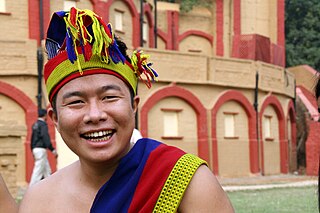
The Adivasi are heterogeneous tribal groups across the Indian subcontinent. The term is a Sanskrit word coined in the 1930s by political activists to give the tribal people an indigenous identity by claiming an indigenous origin. The Constitution of India does not use the word Adivasi, instead referring to Scheduled Tribes and Janjati. The government of India does not officially recognise tribes as indigenous people. The country ratified the International Labour Organization (ILO) Convention 107 on Indigenous and Tribal Peoples of the United Nations (1957) and refused to sign the ILO Convention 169. Most of these groups are included in the Scheduled Tribe category under constitutional provisions in India.
The Indian state of Arunachal Pradesh has a total population of roughly 1.4 million on an area of 84,000 km2, amounting to a population density of about 17 pop./km2. The "indigenous groups" account for about two thirds of population, while immigrants, mostly of Bengali/Hindi belt origin, account for the remaining third.

The Scheduled Castes and Scheduled Tribes are officially designated groups of people and among the most disadvantaged socio-economic groups in India. The terms are recognized in the Constitution of India and the groups are designated in one or other of the categories. For much of the period of British rule in the Indian subcontinent, they were known as the Depressed Classes.

The Baiga are an ethnic group found in central India primarily in the state of Madhya Pradesh, and in smaller numbers in the surrounding states of Uttar Pradesh, Chhattisgarh and Jharkhand. The largest number of Baiga is found in Baiga-chuk in Mandla district and Balaghat district of Madhya Pradesh. They have sub-castes: Bijhwar, Narotia, Bharotiya, Nahar, Rai maina and Kath maina. The name Baiga means "sorcerer-medicine man".

Roughly 8.6 per cent of India's population is made up of "Scheduled Tribes" (STs), traditional tribal communities. In India those who are not Christians, Muslims, Jews, or Zoroastrians are identified as Hindus. The reason being varied beliefs and practices allowed in Hindusim and according of Hindusim as a geographical identity than merely Religious ones. Though, many of the Scheduled Tribes have modes of worship not typical to mainstream Hindusim but ontologically form part of the cultural practices of the land, as Nature or ancestral worship, with varying degrees of syncretism.
Bhoksa, also known as Buksa/Bukhasiya, are indigenous peoples living mainly in the Indian states of Uttarakhand and Uttar Pradesh. They are mostly concentrated in Dehradun and Nainital districts in the foothills of the outer Himalayas. They are also found in the Bijnor district of Uttar Pradesh, where they are known as Khas. Both communities have been granted Scheduled Tribe status.
Bhumij is a Munda ethnic group of India. They primarily live in the Indian states of West Bengal, Odisha, Assam and Jharkhand, mostly in the old Singhbhum district and also in states like Bihar and Assam. There is also a sizeable population found in Bangladesh. Bhumijas speak the Bhumij language, an Austroasiatic language, and use Ol Onal script for writing.

The Tadvi Bhil is a tribal community found in the states of Maharashtra, Gujarat, Madhya Pradesh and Rajasthan in India. They are from the larger Bhil ethnic group, and are a clan of it. They use the surname Tadvi or sometimes the name of their Kul or Gan; the Dhankas of Gujarat and Maharashtra use Tadvi or Tetariya.

Chiru is a Kuki-Chin language spoken mostly in Manipur. The Chiru population numbers approximately 8,599. It is an endangered spoken in three districts of Manipur: Senapati, Noney district of Manipur and Cachar district of Assam. Chiru has been recognized as a Scheduled Tribe of Manipur by the government of India since 1956 under "The Scheduled Castes and Scheduled Tribes Orders (Amendment) Act, Act No. 63 of 1956" Dated 25 September 1956. The total population of the native speakers of Chiru is only 8599. The native speakers have high proficiency in Meitei language. The language is neither used in schools nor in radio or mass media. Older people read and write in Meitei language. The younger generation of Chiru speakers prefers Roman script.
The Patiala and East Punjab States Union Legislative Assembly was the unicameral state-level legislative body of the Patiala and East Punjab States Union in India. Two elections to the assembly were held; one in 1951 and the second one in 1954. The assembly had 60 seats. The assembly used to meet at the Durbar (Court) of Qila Mubarak, the royal fort at Patiala.

The Madhya Pradesh Vidhan Sabha or the Madhya Pradesh Legislative Assembly is the unicameral state legislature of Madhya Pradesh state in India.
The Kerala Legislative Assembly election of 1957 was the first assembly election in the Indian state of Kerala. The Communist Party of India won the election with 60 seats. The election led to the formation of first democratically elected communist government in India. The election also made Kerala as the first state to elect a Non-Congress party in the country.

Elections to the Mysore Legislative Assembly were held on 25 February 1957. 589 candidates contested for the 208 seats of the 179 constituencies in the Assembly.
Elections to the Second Punjab Legislative Assembly were held in 1957. 661 candidates contested for the 154 seats of the 121 constituencies in the Assembly. There were 21 two-member constituencies and 84 single-member constituencies.

The Anāl is a Naga tribe native to Manipur state in North-East India and part of Myanmar. They are listed as a Scheduled Tribe, in accordance with The Scheduled Castes and Scheduled Tribes Orders (Amendment) Act, 1976 Indian Constitution. The Anāl tribe is one of the 'sixty six Naga tribes' of the Naga ancestral homeland. The members of this tribe are found both in India and Myanmar. In India, they are situated in the States of Manipur and Nagaland but mostly concentrated in the former. In the State of Manipur, the Anāl Naga population concentrated in Chandel and a few Anāl villages are located in its neighbouring districts, Churachandpur district has about three villages and Thoubal district has one or two.

Punjab Assembly Committee on Welfare of Scheduled Castes, Scheduled Tribes and Backward Classes of Punjab Legislative Assembly is constituted annually for a one-year period from among the members of the Assembly. The committee focuses on the Scheduled Castes and Scheduled Tribes and Other Backward Class of Punjab population.









